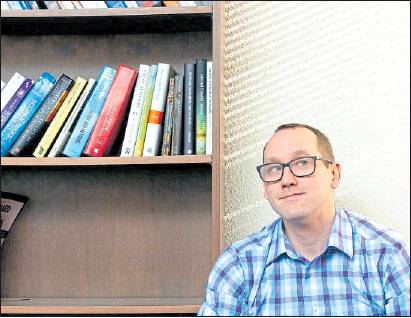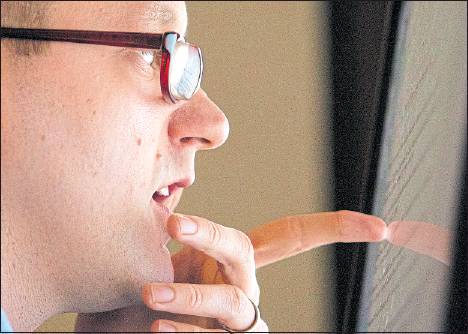HIGHER EDUCATION
Turning failure into success
Temple professor creates a CV of shortcomings.
By Susan Snyder STAFF WRITER
Most academics like to brag about their successes. Doug Webber touts his failures.
He was rejected by the majority of Ph.D. programs he applied to. There were at least a dozen academic projects he started that went nowhere. Most of the research papers he eventually got published were rejected multiple times.
And along the way, there were all those cutting comments from anonymous peer reviewers.
“The bar for new and innovative work required for publication in a good journal is pretty high,” wrote one. “This paper does not reach that bar.”
Webber, an associate professor of economics at Temple University, has laid bare these shortcomings and more, all which came along the road to success. He posted them in August on his Temple web page in a “Failure CV.” In academia, CV stands for curriculum vitae, an academic resumé of sorts.
On the same page, Webber has a regular CV that highlights his successes: All the papers he has had published. His doctorate from Cornell, an Ivy League university. His 2016 Teacher of the Year award from Temple’s economics department; his research in progress; and his congressional testimony.
The economist hopes his brutal honesty in the alternate CV shows graduate students and junior faculty that they shouldn’t get discouraged by the inevitable failures that will come in their careers. It’s a rite of passage in academia.
“It’s really easy to forget that everyone fails,” Webber, 33, said. “It’s perfectly normal to struggle and not get something on the second, third, or fourth time.”
He’s not the first one to undertake such an exercise or suggest it. Melanie Stefan, a lecturer at the Edinburgh Medical School in Scotland, floated the idea in a piece published in 2010 in the scientific journal Nature. Subsequently, Johannes Haushofer, an assistant professor of psychology and public affairs at Princeton, put out his CV of Failures, and apparently it got a lot of views.
“This darn CV of Failures has received way more attention than my entire body of academic work,” he notes at the bottom, under “Meta Failures.”
Joshua Goodman, 40, an associate professor of public policy at Harvard’s Kennedy School of Government, recounted his failures in a tweet string.
He said he wanted to be part of a “culture change” where people talk about their struggles and break down the isolation and frustration that he has seen in younger faculty members.
“What I came to realize is almost everyone goes through a lot of failures for each visible success, and that’s something that younger scholars don’t know,” said Goodman, who joined Harvard in 2009. “They don’t know the peer review process is largely focused on criticism.”
And the acceptance rate for papers at the top academic journals, Webber notes, is something like 5 percent.
“These are what you need to get tenure,” he said.
Job rejection also poses a harsh reality for beginning academics. Webber said his department got 562 applications for a job it posted this year.
One place where Webber appears to have had nothing but success is in reaction to his failure CV.
At conferences and seminars, “I have people come up to me who I have never met and say, ‘I love your failure CV,’ ” said Webber, who also directs Temple’s graduate program in economics.
Temple student Fatima Mboup felt more at ease after she read it. Webber had told students about it in her graduate class last semester.
“It puts everything in a more reachable reality,” said Mboup, 28, who is working toward her Ph.D. in economics.
Unlike many academic projects that can take months, even years, Webber put the CV together in a weekend, with his wife, Catherine Maclean, also a Temple economics professor, and four rescue dogs there for support.
Webber acknowledged it was easier as a tenured professor to unveil his earlier failures. And he wasn’t quite as zen about failure when he was experiencing it.
But he’s certainly not unused to challenges.
Webber is legally blind. His elementary school in Florida’s Tampa Bay area, he recalled, tried to send him to a school for the blind, but his parents successfully fought to keep him mainstreamed.
His father, a nursing home administrator, also took him to the University of Florida to meet his former calculus professor, who was blind.
“He wanted to show me that there are people with really, really bad vision who can really excel academically,” Webber recalled.
The professor soon became a role model for Webber, and he knew he, too, wanted a career as a professor. Webber uses thick glasses to read and carries a monocular, a little telescope, to view things at a distance. At times, his vision made an already challenging path to a doctorate even more challenging.
His adviser at Cornell was impressed with how he met those challenges.
“He has certainly made the most of his abilities,” said Ronald G. Ehrenberg, an economics professor and director of Cornell’s Higher Education Research Institute. “He’s extraordinary.”
It was from Ehrenberg that Webber first recalls hearing about the importance of acknowledging failures, how he t o l d s t u d e n t s h e n e v e r thought he’d have another idea worth publishing after his dissertation, and that was more than 100 publications ago.
Most of Webber’s Failure CV focuses on research and journal article-related hiccups. But Webber also includes an awkward classroom mishap. In quickly labeling a graph on the board that was supposed to be titled “Annual Earnings,” he accidentally left an “n” and the “u” out of “annual.” There was a bit of nervous laughter from the undergraduates.
“I very quickly said, ‘That’s not how you spell annual,’ and completely erased it,” he said.
It was one failure quickly flushed. ssnyder@phillynews.com
215-854-4693 ssnyderinq
“ It’s really easy to forget that everyone fails. It’s perfectly normal to struggle and not get something on the second, third, or fourth time.
Doug Webber, 33, an associate professor of economics at Temple University

